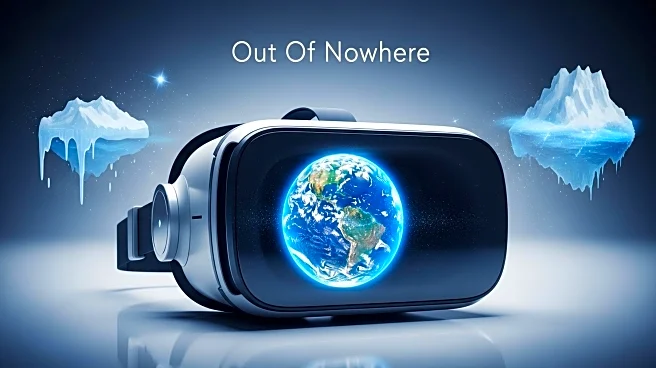What's Happening?
The virtual reality experience 'Out Of Nowhere' recently premiered at Venice Immersive 2025, focusing on the impact of climate change through the story of Anna, a resident of Hallein, Austria. The experience reflects on the severe flooding in Europe during July 2021 and emphasizes the need to reconnect with nature to mitigate future risks. The immersive experience lasts about 10 minutes and uses minimal interactivity, such as hand tracking to sail paper boats, to engage users with its environmental themes. Directors Kris Hofmann and Andreas Wuthe aim to highlight the challenges of an unpredictable climate and the consequences of altering nature to suit human needs.
Why It's Important?
This VR experience underscores the urgent need for awareness and action regarding climate change. By immersing users in environments affected by climate phenomena, it provides a visceral understanding of the potential consequences of environmental neglect. The project aims to foster a deeper connection with nature and encourage sustainable practices. As climate change continues to pose significant threats globally, initiatives like 'Out Of Nowhere' can play a crucial role in educating the public and influencing policy changes. The experience serves as a reminder of the importance of living in harmony with nature rather than attempting to control it.
What's Next?
While the developers have not confirmed a home release, the potential for wider distribution could increase public engagement with climate issues. If released, it could become a valuable educational tool, prompting discussions among stakeholders, including environmental groups and policymakers. The immersive nature of VR experiences may lead to more projects that address environmental concerns, potentially influencing public opinion and policy. As awareness grows, there may be increased pressure on governments and industries to adopt more sustainable practices.
Beyond the Headlines
The use of VR to address climate change represents a growing trend in leveraging technology for social and environmental advocacy. This approach can offer unique insights and emotional engagement that traditional media may not achieve. It also raises questions about the role of technology in shaping public perception and driving change. As VR becomes more accessible, it could transform how society interacts with complex issues like climate change, offering new avenues for education and activism.









